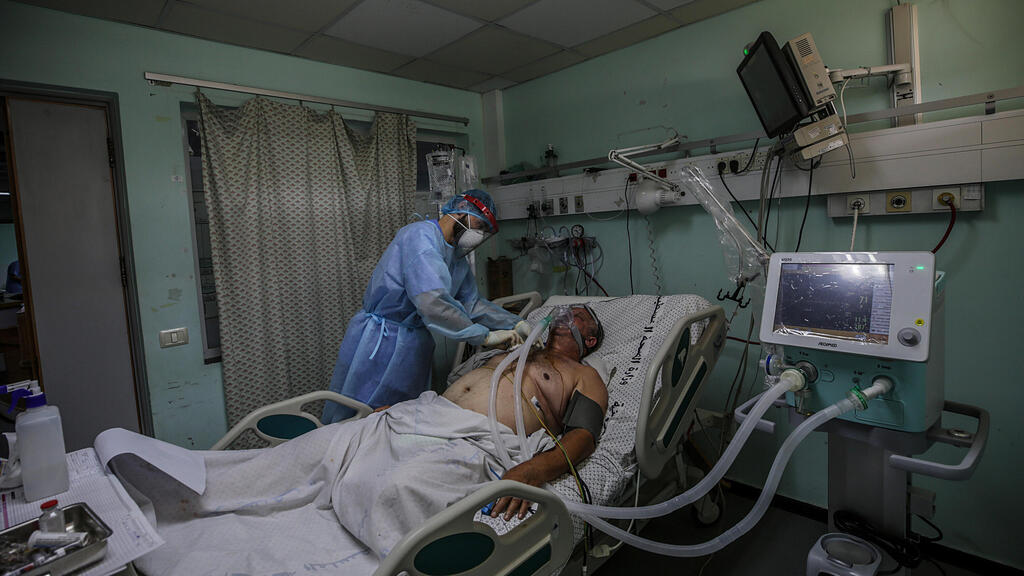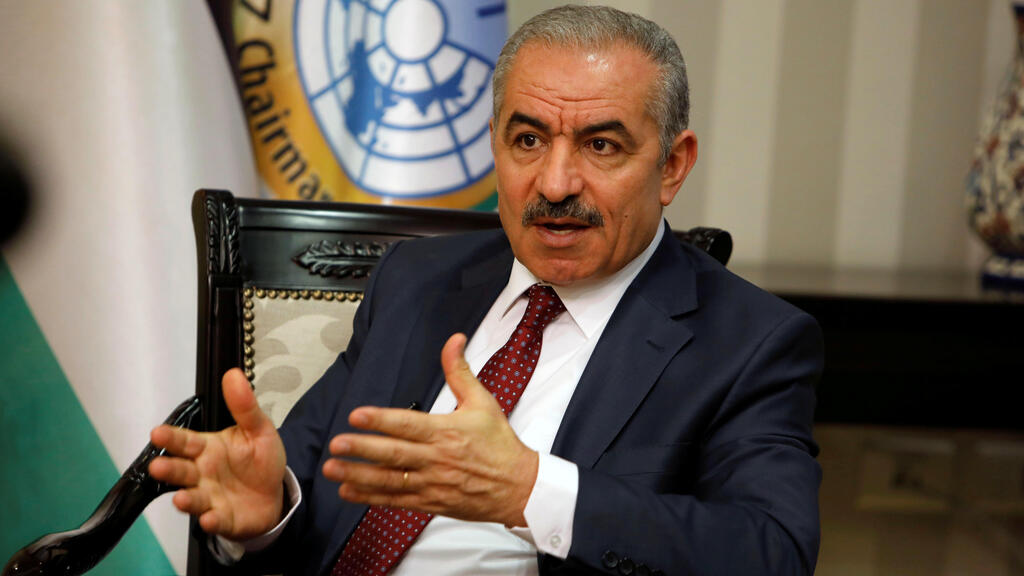The coronavirus pandemic began in the Palestinian Authority with infections discovered at the Angel Hotel in the predominantly Christian town of Beit Jala.
A group of Greek tourists visiting local sites had brought in the virus that then spread throughout the West Bank.
7 View gallery
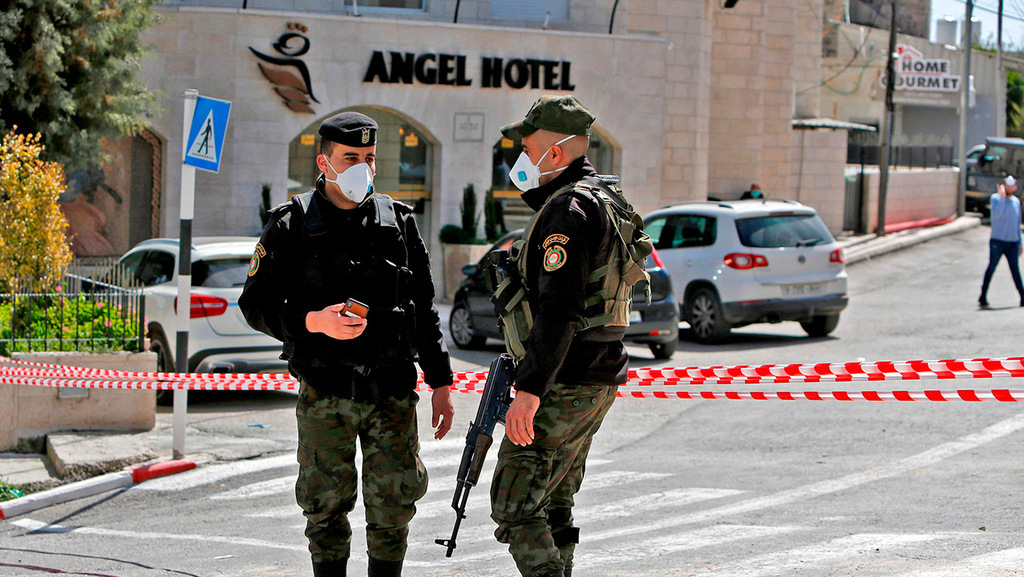

Palestinian police stand outside the Angel Hotel in Beit Jala at the start of the pandemic
(Photo: AFP)
The initial outbreak caused panic. No one in the local government understood how to deal with the spread of the disease.
The Angel became the first coronavirus quarantine hotel, long before that concept was adopted by Israel.
Last week marked a year since the first cases of COVID-19 were detected in the Palestinian territories. Two waves of contagions followed, and the area is now suffering from a third wave, which threatens to be the worst thus far.
There are many similarities in the way Israel and the Palestinian Authority dealt with the pandemic.
Both enforced a strict lockdown at first, with the public adhering to health regulations. During the second wave, public discipline wavered and enforcement began to fail.
7 View gallery
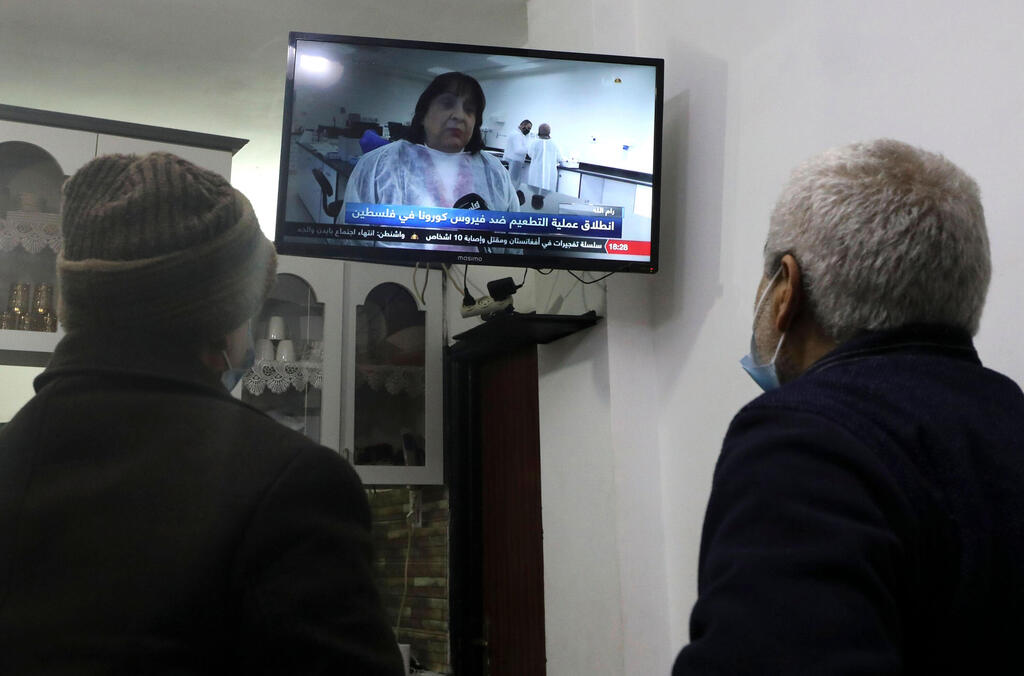

Palestinian men in the West Bank city of Hebron watch as Palestinian Health Minister Mai al-Kaila announces the start of the PA vaccination campaign, Feb. 2021
(Photo: AFP)
During the third wave of the COVID-19 pandemic, the public began showing indifference as police enforcement all but disappeared until the number of cases spiked, prompting authorities to increase restrictions.
The Palestinian Authority was always three to six weeks behind Israel in surges of morbidity. There are now more than 2,000 new cases confirmed daily on the West Bank.
It appears that Palestinian workers crossing the border to and from Israel for work and those employed in industrial areas in the settlements contributed to the spread of disease.
Both Israel and the PA have banned Israeli Arabs from entering the West Bank but that regulation has been hard to enforce.
Unlike Israel, the Palestinian Authority is facing widespread contagion without administering vaccines to the public.
After Israel and the PA renewed their cooperation last November, after it was suspended over Prime Minister Benjamin Netanyahu's June 2020 annexation declaration, Israeli officials told the Palestinian officials that they must make an effort to obtain vaccines.
They also said the PA must take responsibility over the Gaza Strip, which was seized by Hamas in 2007.
The message was received and understood but the Palestinian officials were only partially successful in their efforts to obtain vaccines. The World Health Organization said it would deliver 37,000 doses of coronavirus vaccines, with a third earmarked for Gaza.
AstraZeneca later signed a contract to supply the PA with two million doses. Some 400,000 of them are due to arrive in June, but there is no date for the arrival of the rest.
Russia provided the PA 10,000 doses of its Sputnik V vaccine, but also without a delivery date, while China committed to delivering 50,000 of its locally made vaccines.
7 View gallery
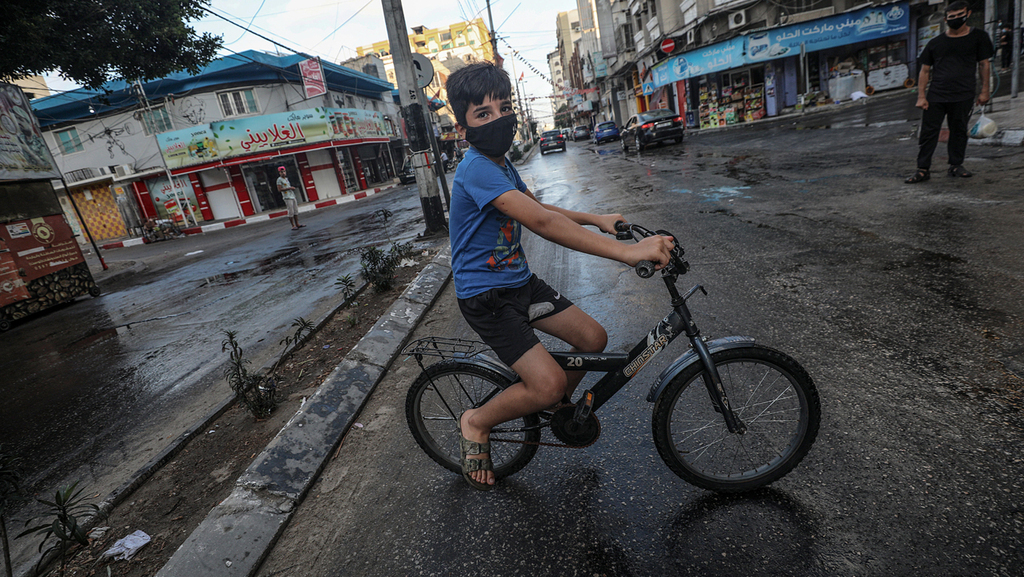

A boy wearing a face mask rides his bike on an empty Gaza street during the coronavirus lockdown
(Photo: EPA)
Israel was the first to actually supply doses for Palestinian medical teams. And while there has been no evidence, some reports indicate that medical teams were not the first to be vaccinated. That privilege went instead to members of the leadership and their families and friends.
Palestinian officials never responded to these allegations but there was public outcry, especially after a photo emerged showing Nasser Laham, founder of the popular Ma'an news website and a supporter of the regime, receiving his shot.
7 View gallery


A cartoon depicting the PA health minister calling on a senior Fatah official to get his vaccine after the founder of the Ma'an News Agency received his
(Photo: Screenshot)
In response, social media sites were soon sharing a cartoon depicting Laham flanked by PA Health Minister Mai al-Kaila calling on high-ranking Fatah official Hussein al-Sheikh to get his jab next.
On Tuesday, Israel began to administer vaccines to 100,000 Palestinians working inside the country and in the settlements, making it the biggest suppliers of the vaccine to the PA.
Because of the proximity to the West Bank, both entities are in the same epidemiological territory and inoculating Palestinians is in Israel's own interest.
A Palestinian source told Ynet that the as far as vaccines were concerned, the PA had done a bad job. He said that political considerations were hampering efforts to obtain them.
7 View gallery
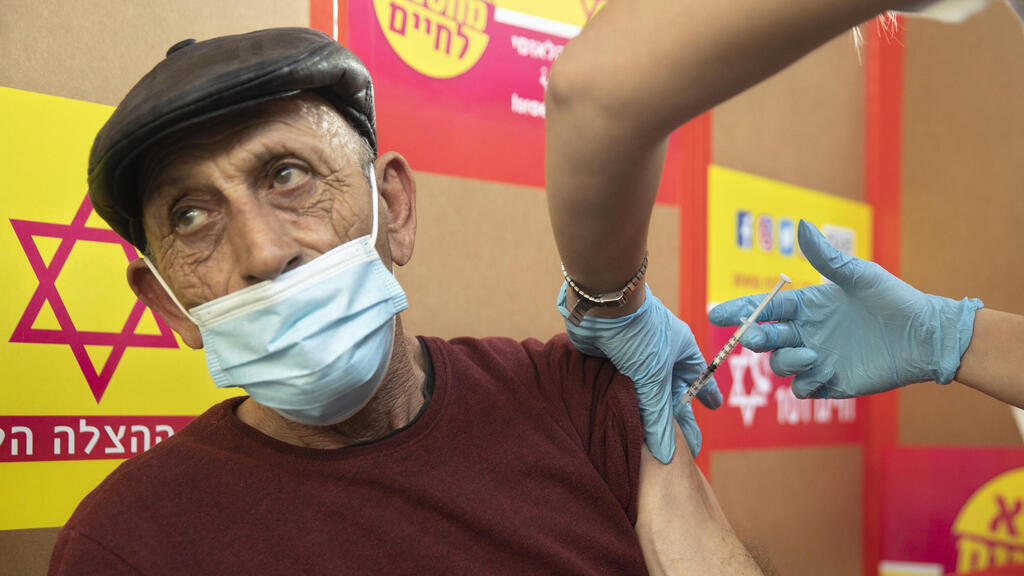

A Palestinian worker receives his coronavirus vaccine from Israel earlier this week
(Photo: AP)
Dr. al-Kaila and Palestinian Prime Minister Mohammad Shtayyeh were trying to get vaccines, but "the leaders above them were disrupting their efforts," the source said.
"There are some who like to take credit for any success in order to increase public support for them."
Another source said that following the failure to obtain the vaccine for eight million Palestinians in the West Bank and another two million in Gaza, the PA asked Israel to intercede with the pharmaceutical companies on its behalf. The PA also reportedly asked Israel to assist in the logistical efforts to transport and store the vaccines.
The British variant of COVID-19 is hitting West Bank Palestinians hard. They are facing the highest number of cases since the start of the pandemic.
Hospitals are working at full capacity while a third of the medical staff are either sick or quarantined after coming into contact with confirmed carriers.
"The Palestinian health system is nearing collapse," the source said.
The PA recently announced new restrictions and lockdowns for the Nablus, Ramallah and Tul Karm as well as the greater Jerusalem area, in the hope that the measures will lead to fewer infections from next week.
If there is no drastic change within the next fortnight, control over the virus could be lost altogether, something that might force Israel to offer more help to deal with the emergency.


